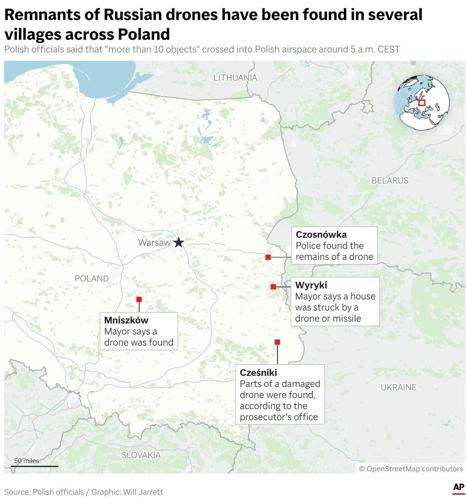BUCHAREST, Romania (AP) ÔÇö RussiaÔÇÖs violation of PolandÔÇÖs airspace with drones on Wednesday marks the most serious cross-border incident into a NATO member country since the war in Ukraine began.
But other alliance countries have reported similar incursions and drone crashes on their territory since 2022.
The overnight incident in Poland has been labelled an ÔÇťact of aggressionÔÇŁ and drew a military response by NATO in shooting down multiple drones, as several European leaders said they believed Moscow was intentionally escalating the war.
But since Russia fully invaded Ukraine in 2022, Croatia and Romania, and non-NATO member Moldova ÔÇö the latter two of which share long borders with Ukraine ÔÇö have reported multiple airspace violations and have found drone fragments on their territory.
Poland’s experience is not the first time NATO airspace has been violated.
String of airspace violations since war started
Romania found , including one that caused a crater near a village across the Danube River from the Ukrainian port of Izmail. That crash site finding followed several other similar incidents that left many Romanians near the border .
In February 2024, that crashed on its territory in the southern town of Etulia. MoldovaÔÇÖs Foreign Minister Mihai Popsoi called it ÔÇťa stark reminder of the violence and destruction sown by the Kremlin.ÔÇŁ
Since 2023, numerous airspace incursions and drone fragment findings have been reported in both countries, and while no one has been hurt in any of the incidents and the origin not always determined, the proximity has often highlighted how easily the war could cross over the Ukrainian border.
Just weeks after the war in Ukraine started, a 6-ton Soviet-era military drone armed with explosives drifted uncontrolled from the Ukrainian war zone over NATO members Romania and Hungary, before . About 40 parked cars were damaged in a large explosion, but no one was injured. Croatian investigators never made public whether the aircraft belonged to Ukraine or Russia.
In early February this year, as the two eastern European neighbors reported aerial vehicles entered their airspace during .
Both countries determined that the drones were Shahed unmanned aircraft that Moscow uses in its war on Ukraine. Moldovan President said at the time that the violations put ÔÇťMoldovan lives at risk,” and the head of the Russian diplomatic mission in Chisinau was summoned. Days later, two more drones entered Moldovan airspace near the border.
In March, RomaniaÔÇÖs Ministry of National Defense said that fragments of a Russian drone carrying explosives were found in southeast Galati county, just 500 meters from a border crossing with Moldova. Investigators determined the fragments were ÔÇťof Russian origin.ÔÇŁ It was subject to a controlled detonation.
Romania adopts legislation to down errant drones
Airspace violations have become so commonplace in Romania in recent years that lawmakers adopted legislation in February allowing the army to shoot down drones that enter its airspace, as a last resort if other measures fail. RomaniaÔÇÖs hard-right parties opposed the law.
Analysts have long viewed such incidents in Romania as potential tests by Russia to see how NATO would react. Romania is frequently scrambling fighter jets ÔÇö as it did early Wednesday ÔÇö to monitor its airspace for potentially encroaching drones.
Radu Tudor, a defense analyst in Bucharest, says ÔÇťmilitary provocationsÔÇŁ from Russia have become commonplace on the eastern flank and that ÔÇťRussia is behaving more and more aggressively.ÔÇŁ
ÔÇťHere is the threat: on air, on the land ÔÇŽ in the Black Sea,ÔÇŁ he told The Associated Press. ÔÇťAlso huge, huge cyber attacks and hybrid attacks, so itÔÇÖs a multi-dimensional attack from Russia on the eastern flank of NATO.ÔÇŁ
ÔÇśRussia must be stoppedÔÇÖ
After the incident on Wednesday in Poland, Romanian President Nicusor Dan said RussiaÔÇÖs latest airspace violation of NATO-member Poland proved that Moscow is ÔÇťconstantly testing our limitsÔÇŁ and shows it is not interested in peace in Ukraine.
ÔÇťRussia must be stopped and pressured to come to the negotiation table,ÔÇŁ Dan wrote on X. ÔÇťWe are united to make NATO and especially the eastern flank, from the Baltic to the Black Sea, more secure.ÔÇŁ
After Russia launched its full-scale invasion of Ukraine in 2022, NATO bolstered its presence on EuropeÔÇÖs eastern flank by sending additional multinational battlegroups to Romania, Hungary, Bulgaria and Slovakia.
ÔÇö
Stephen McGrath reported from Warwick, U.K; Dusan Stojanovic reported from Belgrade, Serbia.





























